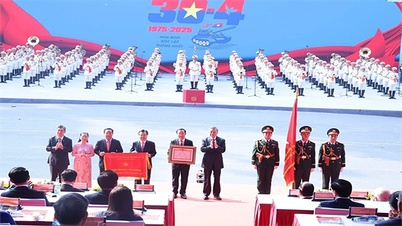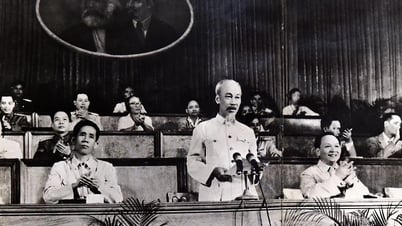On April 24, the National Assembly Standing Committee considered and decided on principles, criteria, and norms for allocating the regular expenditure estimates of the State budget (NSNN) in 2026.
Need overall assessment
Presenting the Government's report, Minister of Finance Nguyen Van Thang said that the development of principles and criteria for allocating regular expenditure estimates is aimed at implementing new policies directly related to the allocation of regular state budget expenditures such as reorganizing the apparatus, exempting tuition fees, ensuring order, security, national defense, prioritizing the fields of science, technology, innovation and digital transformation, education and training, etc.
This will be the basis for the Government to develop and submit to the National Assembly the State budget estimate and the central budget allocation plan for 2026; determine the percentage of revenue division and additional amounts from the central budget for each locality.

Chairman of the Economic and Financial Committee Phan Van Mai presented the review report, stating that the majority of opinions suggested not considering and issuing the resolution at this time. Because according to the submission, April 30, 2025 is the time taken as the basis for determining the indicators and norms related to administrative units specified in the draft resolution.
However, based on the actual situation and documents to be submitted to competent authorities, the restructuring of the apparatus will have many changes after April 30, 2025.
"Therefore, the timing of developing a plan for allocation norms as presented by the Government is not appropriate," said Mr. Mai.
According to Mr. Mai, when there are changes after the arrangement of the apparatus and administrative boundaries, the application of norms in these localities is not just a matter of "mechanical" addition but needs to be evaluated comprehensively, linked to specific factors of natural conditions, management focal points and economic, political and social development needs in the area with new administrative boundaries.
Applying different standards in a commune after the merger can cause difficulties in management and operation.
After the arrangement of the political apparatus and administrative boundaries, the classification of the four regions according to the previous decisions of the Prime Minister may no longer be appropriate, thereby not having enough legal basis to serve as a basis for establishing allocation norms applicable in 2026 and the following years.
In addition, a number of norms related to principles, criteria, and norms for allocating regular expenditures in the draft Resolution are being amended in the State Budget Law that the Government plans to submit to the National Assembly for consideration and approval at the 9th session.
Several new policies expected to be submitted to the National Assembly for approval at the 9th session will impact criteria and norms for regular expenditures in localities.
After the 9th session, submit to the National Assembly Standing Committee
After listening to the delegates' discussion, National Assembly Chairman Tran Thanh Man assessed that the proposal did not meet the conditions for the National Assembly Standing Committee to consider and promulgate.
"We should not rigidly copy the old content, but should base it on the situation of arranging and merging provinces - cities, communes, and ending district level to come up with appropriate criteria," Mr. Man suggested.

Therefore, if the National Assembly approves the project to merge provinces, cities and communes, relevant agencies should consider the appropriate time to pass this resolution.
"If it is postponed after the 9th session, will there be enough time to adjust and complete the contents to promptly build the 2026 budget foundation and expenditure estimates for ministries, branches and agencies? If it is still submitted at this time, how will the issues be handled to ensure consistency with the State Budget Law and the arrangement and organization of the government apparatus, tuition exemption and reduction policies, etc.? If so, there should be transitional provisions in the resolution itself to handle it," the National Assembly Chairman analyzed.
Explaining, Minister of Finance Nguyen Van Thang said that submitting to the National Assembly Standing Committee at this time is in accordance with the State Budget Law.
In fact, if the proposal is approved, the Government will have time to submit to the National Assembly assigned targets and tasks, especially the 2026 State budget expenditure estimate.
Admitting that there are currently some unforeseen issues and that if we delay, we will be able to more fully cover the emerging contents that the Politburo has directed, but Mr. Thang said that if we wait until after the 9th session to pass the resolution, it will be a bit rushed.
"It is possible to issue a resolution in advance and adjust issues that arise later," Mr. Thang said.
Concluding the meeting, Vice Chairman of the National Assembly Nguyen Duc Hai requested the Government to update the situation, closely follow the amendment of relevant laws and resolutions passed during the 9th session, absorb opinions to complete the draft resolution and ask for opinions from the National Assembly Standing Committee to issue it after the 9th session.
"This is important content. The government said it is necessary because to estimate the budget, there must be norms. However, when establishing norms without a basis, the estimation is difficult to be accurate. Therefore, it should be delayed a step after the 9th session," Mr. Hai emphasized.
Source: https://baodaknong.vn/sap-nhap-tinh-xa-xong-moi-ban-hanh-dinh-muc-phan-bo-chi-thuong-xuyen-250643.html




![[Photo] "King Cobra" Su-30MK2 completed its glorious mission on April 30](https://vphoto.vietnam.vn/thumb/1200x675/vietnam/resource/IMAGE/2025/4/30/5724b5c99b7a40db81aa7c418523defe)
![[Photo] Panorama of the parade celebrating the 50th anniversary of the Liberation of the South and National Reunification](https://vphoto.vietnam.vn/thumb/1200x675/vietnam/resource/IMAGE/2025/4/30/affbd72e439d4362962babbf222ffb8b)
![[Photo] Mass parade to celebrate 50 years of national reunification](https://vphoto.vietnam.vn/thumb/1200x675/vietnam/resource/IMAGE/2025/4/30/825e459ee2f54d85b3a134cdcda46e0d)
![[Photo] The parade took to the streets, walking among the arms of tens of thousands of people.](https://vphoto.vietnam.vn/thumb/1200x675/vietnam/resource/IMAGE/2025/4/30/180ec64521094c87bdb5a983ff1a30a4)



























































































Comment (0)